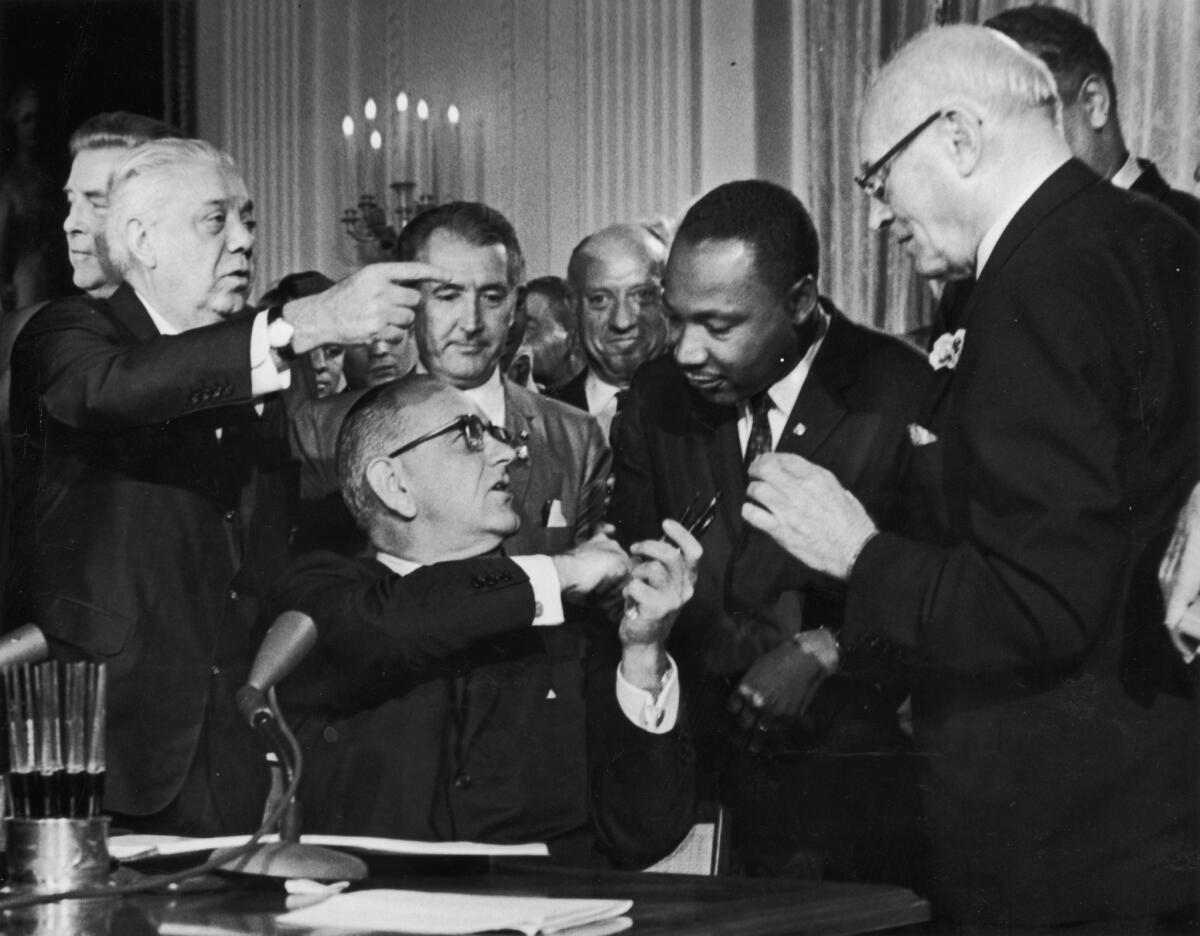Column:: ‘Selma’ and why, half a century later, we’re still struggling with the 1960s

The powerful film “Selma” is stirring audiences across the country with its compelling portrayal of Martin Luther King Jr. and the heroism of ordinary African Americans as they demanded the right to vote a half century ago.
But the movie has stirred controversy, too, for its portrait of President Lyndon B. Johnson as a leader whose commitment to civil rights was hesitant at best and duplicitous at worst.
Some of his former aides and veterans of the civil rights movement, including one-time Atlanta Mayor Andrew Young, have agreed that the movie is too harsh on LBJ, who wanted a voting rights law but didn’t think he had the political capital to push one through Congress quickly.
King’s marches, and the brutality of Alabama sheriffs’ deputies captured by the media, mobilized the public support Johnson needed. The president introduced a bill within days with a dramatic speech to a joint session of Congress, declaring: “We shall overcome.” He manhandled the bill to passage in a matter of months. And when he signed the Voting Rights Act with King at his side, LBJ gave the civil rights leader full credit.
So why are we still arguing over who did what in 1965? In part because half a century later, we’re still struggling with the ‘60s. And we’re in for a lot more arguing, because the midpoint of the 1960s was exactly 50 years ago this year.
That’s not as arbitrary a marker as it sounds. The year 1965 was, roughly speaking, the hinge between what historian Bernard von Bothmer has called the “good ‘60s,” the early-decade era of John F. Kennedy and civil rights, and the “bad ‘60s,” the late-decade slide into domestic chaos.
A long list of anniversaries lies in wait — many of them, like Selma, conspiring to revive old arguments and reopen old wounds.
The second half of the ‘60s saw the escalation of the Vietnam War and the rise of the antiwar movement, mostly nonviolent but occasionally violent. It saw the triumph of the civil rights movement and the rise of black nationalism, but also the Watts riots of 1965 and disturbances in other cities. And in 1968, King and Robert F. Kennedy were assassinated.
The sweeping cultural revolution of those years is caricatured as sex, drugs and rock ‘n’ roll, but it also ushered in a new feminism (the National Organization for Women was founded in 1966) and a gay rights movement (New York’s Stonewall riots, 1969).
No wonder we’re still trying to sort out what it all meant.
A large chunk of Republican politics since 1968 has been about denouncing the disorder of the late ‘60s and ensuring that it never happens again. Richard M. Nixon ran against the demonstrators and rioters in 1968 and 1972, and so did Ronald Reagan in 1980. As recently as 2002, George W. Bush was still campaigning against the ‘60s. “For too long, our culture has said, ‘if it feels good, do it,’” he said in his State of the Union address that year.
Democrats have treated the era more warily. At the time, it tore their party apart, and a generation of their leaders participated in its struggles. They’ve sought to embrace the positive parts of that legacy without being tarred as “counterculture McGoverniks” — which is what Newt Gingrich called Bill Clinton in 1992.
That sort of talk could yet recur, if only because potential Democratic presidential candidate Hillary Rodham Clinton spoke out against the Vietnam War back in 1968, as a student leader at Wellesley College. Intriguingly, though, Republican Jeb Bush’s mother, Barbara Bush, was quoted in a 1984 interview as saying that he considered applying for conscientious objector status during Vietnam. In 2002, when he was running for governor of Florida, Bush said his mother’s comments had been misconstrued.
But the counterculture has its defenders, such as David Harris, the onetime antiwar leader who spent three years in prison for resisting the draft.
“We deserve far better treatment from the history books than we have received,” Harris told a recent reunion of antiwar activists at Stanford.
“The America that I grew up in in the 1950s,” he said, “was monochromatic in every sense of the word. It was a land without options.... The paradigm of uniformity that we were all born into died, and it was replaced by choices and options — maybe by now to such a degree that all those choices are a dilemma.”
So Republicans won’t demand a return to the 1950s. Americans born long after the ‘60s may never have heard of the counterculture, but they take for granted the personal freedoms it won.
That won’t settle any of the arguments, though. A half-century later, the debate over the 1960s isn’t dead. It’s not even past.
Twitter: @DoyleMcManus
More to Read
Start your day right
Sign up for Essential California for news, features and recommendations from the L.A. Times and beyond in your inbox six days a week.
You may occasionally receive promotional content from the Los Angeles Times.







